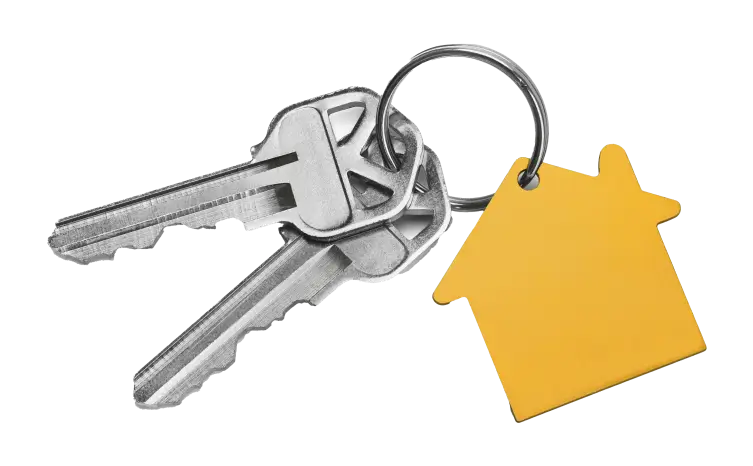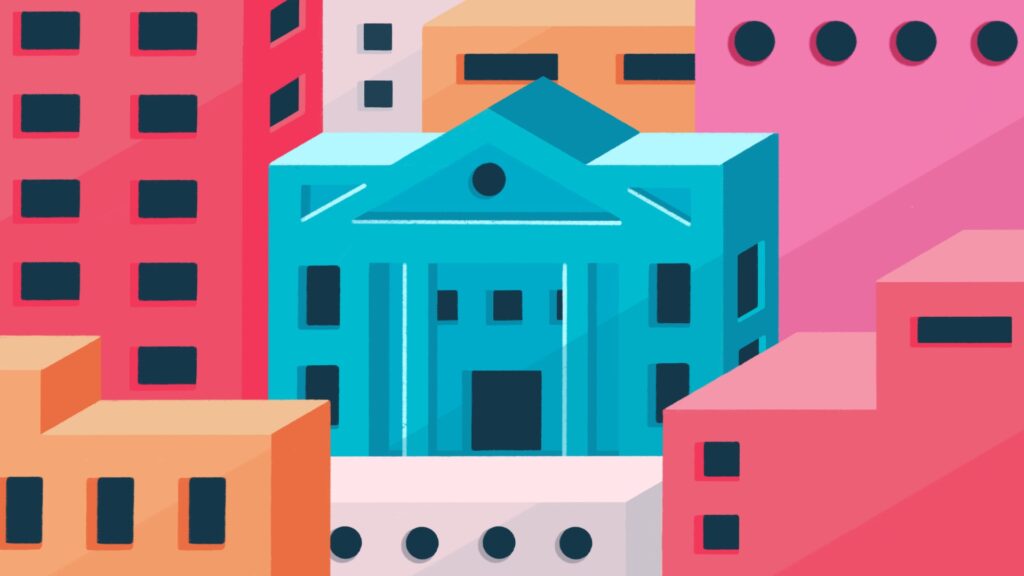Mortgage Programs
Flexible Mortgage Solutions
Whether you’re buying your first home or refinancing, our range of mortgage options are designed to meet your unique needs. Learn more about our competitive rates, flexible terms, and support at every step.

Mortgages
FHA Loans
An FHA loan is insured by the Federal Housing Administration, a federal agency within the U.S. Department of Housing and Urban Development (HUD). The FHA does not loan money to borrowers, rather, it provides lenders protection through mortgage insurance (MIP) in case the borrower defaults on his or her loan obligations. Available to all buyers, FHA loan programs are designed to help creditworthy low-income and moderate-income families who do not meet requirements for conventional loans.
FHA loan programs are particularly beneficial to those buyers with less available cash. The rates on FHA loans are generally market rates, while down payment requirements are lower than for conventional loans.
Some of the other benefits of FHA financing:
- Only a 3.5 percent down payment is required
- Some closing costs can be financed
- Lower monthly mortgage insurance premiums
- More flexible underwriting criteria than conventional loans
- FHA limits the amount lenders can charge for some closing cost fees (e.g. the origination fee can be no more than 1% of mortgage)
- Loans are assumable to qualified buyers
VA Loans
VA guaranteed loans are made by lenders and guaranteed by the U.S. Department of Veteran Affairs (VA) to eligible veterans for the purchase of a home. The guaranty means the lender is protected against loss if you fail to repay the loan. In most cases, no down payment is required on a VA guaranteed loan and the borrower usually receives a lower interest rate than is ordinarily available with other loans.
Other benefits of a VA loan include:
- Closing costs are comparable and sometimes lower – than other financing types
- No private mortgage insurance requirement
- Right to prepay loan without penalties
- The Mortgage can be taken over (or assumed) by the buyer when a home is sold
- Counseling and assistance available to veteran borrowers having financial difficulty or facing default on their loan
Although mortgage insurance is not required, the VA charges a funding fee to issue a guarantee to a lender against borrower default on a mortgage. The fee may be paid in cash by the buyer or seller, or it may be financed in the loan amount.
A VA loan can be used to buy a home, build a home and even improve a home with energy-saving features such as solar or heating/cooling systems, water heaters, insulation, weather-stripping/caulking, storm windows/doors or other energy efficient improvements approved by the lender and VA.
Veterans can apply for a VA loan with any mortgage lender that participates in the VA home loan program. A Certificate of Eligibility from the VA must be presented to the lender to qualify for the loan.
Conventional Loans
When you’re just starting the mortgage application process, you may be confused about all of the options you have. A conventional mortgage loan is the right choice for many people.
A conventional mortgage is offered by a bank and is not insured by the federal government. This makes it a slightly higher risk for the bank, so the qualifications are more strict. A conventional loan may require a higher down payment or a lower debt to income ratio. Like other types of mortgages, the interest rate you pay is based on your credit score and down payment or amount of equity. A conventional mortgage could have a fixed rate or a variable interest rate.
Down Payment
The biggest difference between a conventional mortgage and other mortgage programs is the required down payment. Government-backed mortgages have low down payment requirements to help home buyers move into a home and are often easier to qualify for. For example, you could get an FHA mortgage with just 3.5 percent down and a VA mortgage with no down payment. Banks have different requirements for the down payment on a conventional mortgage, ranging from 5 to 20 percent.
Conforming vs. Non-Conforming
Conventional loans can be either conforming or non-conforming. If it’s conforming, it will be for an amount under a specified maximum. In most areas, this is $806,500 for a single-family home, but the amount is higher in certain areas and when you are purchasing a multi-family home. Non-conforming mortgages are for loan amounts over the current conforming limit, usually called a jumbo loan.
Advantage of Conventional Mortgage
When you make a down payment of less than 20 percent of the value of the home, Fannie Mae and Freddie Mac will require you to purchase private mortgage insurance or get a second lien if you have a conventional mortgage. (If you have another type of mortgage, you have to pay a mortgage insurance premium.) These are similar fees, but in the conventional mortgage, you do not have to pay this once you reach 20 percent equity in your home.
You may be eligible for a Conventional Loan if…
- You have debt-to-income ratio of 28-45
- You have a credit score of 620 or above
- You have 5-20% down payment
Refinancing
There are a huge number of refinancing programs available to borrowers. Contact one of our Mortgage Loan Officers and we’ll work with you to qualify you for the best refinance loan for your financial situation. Surveying your options, you can determine your goals for your refinance.
Lowering Your Payments
Are you refinancing primarily to lower your rate and monthly payments? If so, your best option may be a fixed-rate loan. Maybe you now have a higher rate fixed rate mortgage, or perhaps you have an ARM — adjustable rate mortgage — where the interest rate can vary. Even as interest rates rise, a fixed rate mortgage loan must stay at the same, low-interest rate, unlike an ARM. If you are not expecting to move in the near future (about five years), a fixed rate mortgage loan can especially be a good option. However, an ARM with a low initial payment may be a smarter way to lower your monthly payments if you plan on moving in the next few years.
Getting Out Some Cash
Is “cashing out” your primary reason for your refinance? Your home needs updating; your son has been accepted to University and needs tuition money, or you are taking your family on a cruise. With this in mind, you’ll want to get a loan above the balance remaining on your current mortgage. In this case, you will need to qualify for a loan for more than the current balance on your current mortgage loan in that case. If you’ve had your existing mortgage loan for a number of years and/or have a mortgage whose interest rate is high, you may be able to do this without increasing your monthly payment.
Consolidating Your Debt
Do you hold other debt, perhaps with high interest, that you want to consolidate? If you have the home equity to make it work, paying off other debt with higher interest than the rate on your mortgage (such as car loans, credit cards, student loans, or home equity loans) means you can possibly save hundreds of dollars in your budget each month.
Building Up Equity Faster
Are you dreaming of paying your loan off sooner, while beefing up your home equity quicker? If this is your wish, then refinancing can change you to a mortgage program with a shorter term. The mortgage payments will likely be higher than with a longer term mortgage loan, but in exchange, you will pay substantially less interest and can build up equity quicker. However, if you’ve held your current mortgage for a number of years and the loan balance is rather low, you may be able to do this without increasing your mortgage payment — you could even be able to save! To help you figure out your options and the multiple benefits in refinancing, please contact one of our Mortgage Loan Officers. We are here for you.
Jumbo Loans
A Jumbo loan is for borrowers looking to finance a property that exceeds the $806,500 (in most areas) loan amount maximum imposed by Fannie Mae and Freddie Mac. This loan is similar to traditional mortgages, but due to the increased risk to the lender, there are more stringent underwriting guidelines.
Benefits of a Jumbo Loan
- Borrower can access larger loan amounts for expensive properties or construction of a dream home
- No need to break up your borrowing needs across two loans
- No need to access savings for large down payments
- Flexible fixed rate or adjustable-rate terms
Is a Jumbo Loan right for me?
If the property you are looking to purchase will have a loan amount over $806,500 (in more expensive markets, the minimum amount requirements for a Jumbo loan increase) then a Jumbo Loan is what you need. Examine your finances closely and locate a lender only when you’re confident the larger repayment schedule will not be overwhelming.
You may be eligible for a Jumbo Loan if…
- You have a low debt-to-income ratio
- Debt does not exceed 43% of pre-tax income including PITI, installment debt and minimum revolving credit card payments
- You can provide 2-years proof of income
- You have a credit score of at least 700
- You have 20%-30% for a down payment
- The property meets lender’s qualifications
New Construction Loans
A First National Bank Mortgage Construction-to-Permanent loan allows the builder to construct your home, while giving you the option to convert to a permanent home loan at the end of the construction project.
During the construction process, the mortgage borrower pays interest-only payments based on the amount drawn for the loan.
Build Your Dream with a Construction-to-Permanent Loan
- New home construction loans for those who want to build their dream home
- Additions to existing homes adding $25,000 or more
- 60 days from construction completion, qualified borrowers may lock on a new term
- Borrowers must qualify for a loan with existing and proposed housing expenses
- Construction-to-Permanent Loans are processed, underwritten, closed, funded, and drawn at First National Bank’s Loan Origination and Processing office
- Progress inspections are completed by an independent inspector prior to releasing funds
- No per-draw fees and funds are wired directly into your construction account
- Unlike traditional construction loans, applicants pay closing costs once with the Construction-to-Permanent Loans.
- Three and five-year Adjustable Rate Mortgages are available on Portfolio products
Professional Mortgage Loans
Professional Mortgage Loans are a home financing option that uses future earning potential and a low down payment to make home ownership more accessible to individuals in specialized professional degree programs. These loans are designed specifically to fit the needs of professionals working in various fields such as medicine, dentistry, finance and law.
Whether you have just left residency, recently started your professional career, or you’re active in a fast-growing medical practice, our Professional Mortgage Loans provide flexible financing options to help you finance the home of your dreams.
Professional Loans from First National Bank Mortgage offer flexible terms, such as individualized payment and maturity options.
With our years of experience assisting high-income professionals, and First National Bank’s specialized financing options, you can be assured your home financing will fit your needs.
Ready to Make a Move?
Talk to an experienced loan officer who is ready to assist you buy, build, or refinance.



